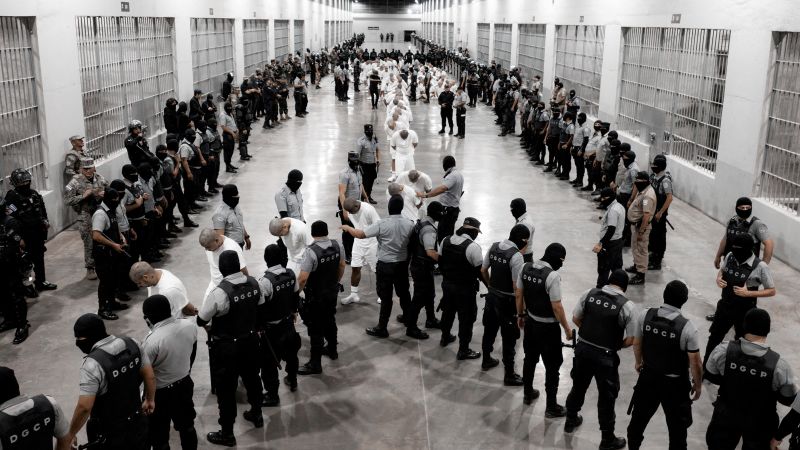Here’s a paraphrased version of the article, maintaining the core information and formatted in HTML:
<div>
<p>
<cite class="source__cite">
<span class="source__location" data-editable="location"/>
<span class="source__text" data-editable="source">CNN</span>
—
</cite>
</p>
<h2>Release Petition Process for Venezuelan Deportees</h2>
<p data-editable="text">
Families of Venezuelans who have been deported and are currently detained in El Salvador's notorious Cecot prison can appeal to the Salvadoran government for their relatives' release, though the effectiveness of this process remains uncertain in a nation criticized for arbitrary detentions by human rights organizations and the US State Department.
</p>
<h2>Human Rights Commission's Role</h2>
<p data-editable="text">
Andrés Guzmán, the head of El Salvador’s Human Rights and Freedom of Expression Commission, reported to CNN that families who believe their loved ones are being held “unjustly” can file their complaints with his office.
</p>
<h2>Concerns Over Deportations</h2>
<p data-editable="text">
Relatives of 238 Venezuelans deported from the United States have been anxiously awaiting updates on their situation. These individuals, along with 23 Salvadorans, were deported last weekend by US President Donald Trump, who accused them of being connected to gang activities like the Tren de Aragua. Following this, they were moved to the Cecot mega-prison, the largest in the Americas.
</p>
<h2>Criticism of Treatment</h2>
<p data-editable="text">
Families have reported recognizing their relatives among the deportees and have vehemently rejected the accusations against them. Both the Venezuelan government and the families have condemned the treatment their relatives are undergoing in El Salvador, stating that there is a lack of evidence from either government to support the claims of gang affiliation.
</p>
<h2>Concerns Over Prison Conditions</h2>
<p data-editable="text">
The mega-prison, designed to hold 40,000 inmates, has faced consistent criticism from rights groups for the alleged harsh treatment of prisoners. The US State Department has reported cases of torture and cruel treatment by security forces, highlighting distressing prison conditions and arbitrary detentions in El Salvador.
</p>
<h2>Challenges for Detainees and Their Families</h2>
<p data-editable="text">
Experts suggest that the efforts of Guzmán’s office may not lead to substantial outcomes, as it lacks decision-making authority and merely relays information about unjust detentions to appropriate agencies. Gustavo Flores-Macias from Cornell University mentioned that the commission's intervention is unlikely to be effective, given its association with the Bukele administration, which prioritizes defending its own record over advocating for the detainees.
</p>
<h2>Continued Tensions and Repatriation Efforts</h2>
<p data-editable="text">
On a related note, the Salvadoran government asserts that the rights of the deported individuals are being upheld while denying any wrongdoing. Venezuelan President Nicolás Maduro has called for the return of Venezuelans detained in El Salvador, expressing the need for repatriation and emphasizing that migrating is not a crime. However, public dissatisfaction and tensions between the US and Venezuela continue to escalate, leading to protests in Venezuela demanding the return of deported relatives.
</p>
</div>This version summarizes the core points of the original article while adhering to the specified structure and formatting.



